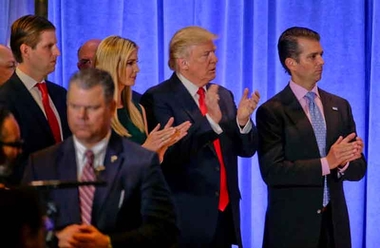Ethics official denounces Trump's plan for business

New York (AP) — President-elect Donald Trump said Wednesday he will continue to profit from his global business empire after he enters the White House this month — a precedent-breaking decision that the director of the Office of Government Ethics swiftly condemned as unpatriotic.
At a news conference announcing a much-anticipated plan for dealing with his sprawling company, Trump and his lawyer said the Trump Organization would be run by the president-elect's adult sons and a longtime company executive, although the president-elect will retain an ownership stake in a trust that holds his business assets.
Sheri Dillon, an attorney with the firm Morgan Lewis & Bockius, said the company will pursue new deals in the U.S. but will not enter new foreign arrangements while Trump is in office.
The steps are to assure Americans that he is "not exploiting the office of the presidency for his personal benefit," she said.
The decision to stop new ventures abroad was one of Trump's few concessions to ethics experts who have warned that the real estate development and licensing company's international footprint could expose him to conflicts of interest. They have warned that foreign governments might try to curry favor with him or influence U.S. policy by cutting deals with his company and speeding approval for his projects.
The concerns have thrust a typically obscure office into the limelight. The Office of Government Ethics, which advises incoming presidents and their administration officials but is not an enforcement agency, on Wednesday urged Trump to go much further to distance himself. OGE Director Walter Shaub said Trump should sell off his businesses and put the proceeds in a blind trust overseen by an independent manager.
"I don't think divestiture is too high a price to pay to be the president of the United States of America," said Shaub, during a blistering 15-minute critique.
Explaining why presidential appointees, nominees and presidents themselves typically sever all business ties, Shaub said:
"Their basic patriotism usually prevails as they agree to set aside their personal interest to serve their country's interests."
Shaub praised some of Trump's Cabinet nominees for making a "clean break" from business entanglements, singling out Rex Tillerson, whose Senate confirmation hearing to become secretary of state was held Wednesday as Trump was speaking in New York.
The president-elect and his lawyer vigorously defended his plan, saying it would be impractical for Trump to sell off his company.
Doing so, Dillon said, would create its own ethical questions about whether he was receiving a fair price. And moving too quickly could create a "fire sale" environment that devalued the company to which he has dedicated his adult life.
"President-elect Trump should not be expected to destroy the company he built," Dillon said.
The business arrangements, announced at Trump Tower in New York during Trump's first news conference since July, appeared to walk back a broader promise he made last month in a Fox News interview and a tweet that the company would do "no new deals" while he is in office.
Along with Shaub — who was appointed to a five-year term by president Barack Obama in 2013 — Republican and Democratic government ethics counselors have urged Trump to take bigger steps.
"Firewalls work in businesses, not in families," said Danielle Brian, executive director of the Project on Government Oversight. "Trump's plan doesn't prevent his business interests from benefiting him or his family while he's in office or interfering with his presidential duties."
Trump stressed that a president is not subject to the same conflict-of-interest provisions as Cabinet members and other government employees.
"I could actually run my business and run government at the same time," he said. "I don't like the way that looks, but I would be able to do that if I wanted to."
Yet presidents have typically followed the same rules as their Cabinet members as a best practice.
President Jimmy Carter sold his Georgia peanut farm when he took office. Soon after he was inaugurated, Ronald Reagan cashed out his personal holdings — worth about $740,000 — and put the money in a blind trust.
Trump's dealings are far more complex; he has struck deals involving hotels, office buildings, golf resorts and residential towers in about 20 countries.
Dillon said the company will add an ethics adviser to its management team who must approve deals that could raise concerns about conflicts. Trump's transition team has not said whether he will appoint a White House ethics adviser as two previous presidents have done.
Trump's sons Eric and Donald Jr. will run the company along with Allen Weisselberg, the current chief financial officer. Weisselberg began work with the Trump family decades ago under the president-elect's father, Fred.
Dillon also addressed the "emoluments clause" of the U.S. Constitution. Some lawyers have claimed that foreign leaders who pay for rooms and services at his hotels across the globe would put the president-elect in violation.
She argued that "fair-value exchange," such as paying for a hotel room, does not run afoul of the ban on foreign gifts or payments to the president.
Nonetheless, she said, the company plans to donate money spent by foreign governments at his hotels to the U.S. Treasury.
The president-elect's new hotel in the nation's capital, has already hosted diplomats from Bahrain and Azerbaijan.
By Bernard Condon and Julie Bykowicz, Associated Press. Copyright 2017 The Associated Press. All rights reserved. This material may not be published, broadcast, rewritten or redistributed.
The Gayly – January 11, 2017 @ 5:20 p.m.





